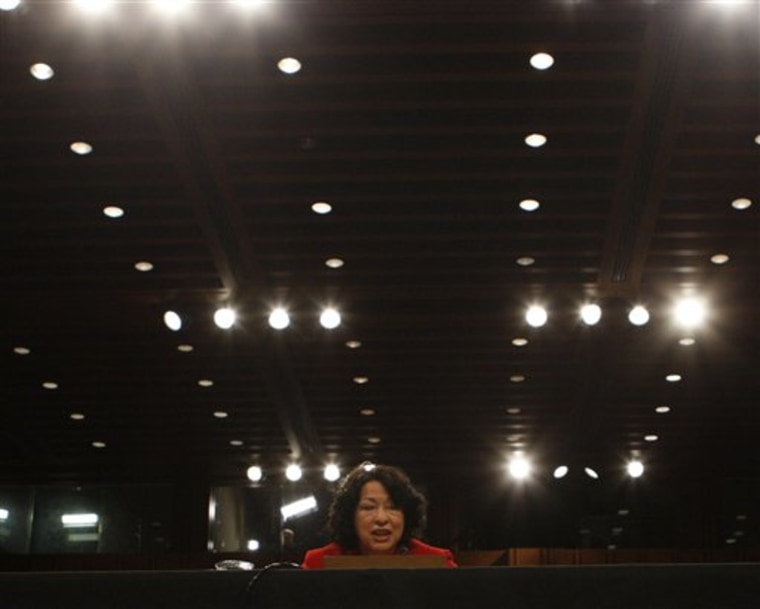It's a good thing Sonia Sotomayor speaks Sotomayoran.
After week upon week in which plenty of other people on the planet interpreted Sotomayor's past comments, the Supreme Court nominee at last got a chance to deconstruct her own words Tuesday before the Senate Judiciary Committee.
Fingers splayed, palms flat, hands bouncing up and then deliberately pressing down to the table, Sotomayor elaborated, clarified, expanded, retracted.
She drew loopy circles on her paper; she ran rhetorical circles around her past words.
"I didn't intend to suggest ..." she explained.
"What I was speaking about ..." she offered.
"As I have tried to explain ..." she parsed.
"I wasn't talking about ..." she demurred.
She was a tough critic at times.
"I was using a rhetorical flourish that fell flat," she averred.
"It was bad," she said. Of her own words.
Democrats were only too happy to take Sotomayor's rhetorical revisions at face value as she explained away the most problematic of her past remarks.
Judiciary Committee Chairman Patrick Leahy began the first round of Q-and-A with Sotomayor by denouncing her harshest critics and then lobbing her a softball:
"Here's your chance," he told her. "You tell us what's going on here, judge."
With that, Sotomayor had her first chance to recalibrate herself after sitting through a full day of opening statements.
"Thank you for giving me an opportunity to explain my remarks," she said, and it was no throwaway line.
Sotomayor's much-remarked-upon past statements that a "wise Latina" judge could be expected to reach a better conclusion than a white man without the same life experience? Simply meant to inspire young people that they could become whatever they want, she said.
Her suggestion that appeals court judges don't just interpret the law, they help make it? Taken out of context.
Republicans didn't readily sign on to Sotomayor's after-the-fact revisions.
"I don't think it's that clear," Sen. Jeff Sessions, R-Ala., objected at one point.
"I think a person could reasonably believe it meant more than that."
The back-and-forth went on for hours, but even Sotomayor's critics didn't see any signs of a "meltdown," which GOP Sen. Lindsey Graham had said a day earlier was probably the only thing standing between Sotomayor and confirmation to the Supreme Court.
"If there's a test for judicial temperament, you pass it with an A-plus-plus," Sen. Dianne Feinstein, D-Calif., enthused.
As controlled as her performance was, Sotomayor did allow a bit of her personality to filter through as the day wore on.
Asked about the issue of allowing cameras into the Supreme Court, Sotomayor wisely ducked the issue that divides those likely to be her future colleagues.
But she also called herself "a pretty good litigator," suggesting she might be able to work on the fellow justices behind close doors.
"When I worked hard at trying to convince my colleagues of something after listening to them, they'll often try it for a while," she said. "I mean, we'll have to talk together. We'll have to figure out that issue together."
Sotomayor seemed to be feeling her oats as she held her own hour after hour.
When Republican Sen. John Kyl of Arizona launched into his round of questioning during the afternoon without any preface or greeting, Sotomayor called him on it.
"Good afternoon, by the way," she reminded him.
"Oh, I'm sorry?" Kyl asked.
"Good afternoon, by the way," she repeated.
"Yes, good afternoon," Kyl offered.
